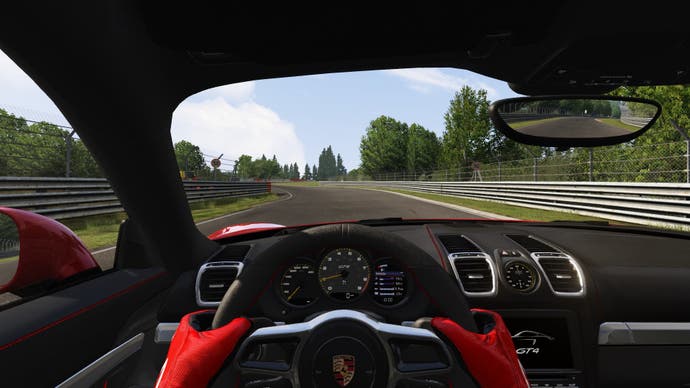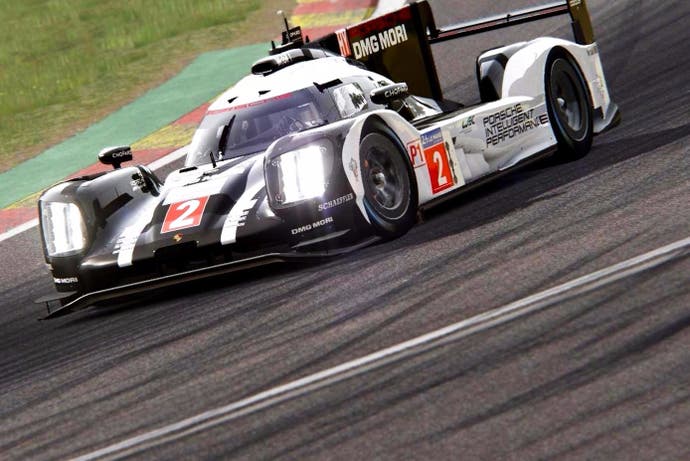Where can the finest driving sim in years go next?
'It's a very difficult community'.
Kunos Simulazioni is facing a bit of a conundrum.
On the one hand it has created one of the finest driving simulators in years, and has every right to be proud of its achievements. Its profile has never been higher, its talents as a developer capable of modelling exquisite handling never more widely appreciated.
Yet, by its own admission, it stumbles when it comes to making games. When Assetto Corsa first came out of early access at the tail-end of 2014, its shortcomings were washed over in part by an eager and talented PC modding community, and happily overlooked by an audience that's perhaps more dedicated than that you'd find elsewhere.
Come the console release last year, people were less forgiving. Some players, new not only to Kunos Simulazioni but also to a serious-minded driving simulator, were shocked by its brutal nature and lack of airs and graces. In many ways, it was a rude awakening for the developer. "Technically, it was a challenge," says Stefano Casillo, Kunos' refreshingly straight-talking co-founder, over Skype. "It was the first time for us - we knew nothing about the certification process you have to go through, what kind of features they might require your game to have. You get to a situation where you think you have a game, then you realise you still have a lot of work to do to make Microsoft and Sony happy. It was quite a shocking experience!"
The critical reception to Assetto Corsa was a lot cooler to that it enjoyed on PC, although since the game hit Steam Early Access in 2013 Kunos has gained plenty of experience of responding to player feedback, especially when it comes to this most demanding of audiences. "The racing sim community is a very difficult community," says Casillo. "They can be incredibly vocal when there's something they're not happy about. From our point of view, there were some things we misjudged when it came to the audience we were going to cater to.
"A lot of players on console judged the game to be very difficult - especially when it comes to AI performance. On the PC, if you put it on the lowest level, you still have to get around the track and be consistent to have a chance not to finish last. I think the audience on console was expecting an experience where they could crash and spin a few times and still be able to get back to the AI cars. From that point of view, it is a different audience. The audience on PC takes for granted the fact that before you attempt the race you should know the track quite well and have gone through 100s of laps of practice, knowing the braking points and be able to race consistently. The console audience expects a game that drives you through the progression, which isn't something Assetto Corsa is very good at."
Post-release, Kunos has dialled back the difficulty on console somewhat, lowering the AI level among other tweaks, though I've always been respectful of the fact it never looked to dial back Assetto Corsa's handling model at any point. Kunos has faith in its handling, and doesn't want to muddy it with any common contrivances found elsewhere in the genre.
"That's the thing when you're developing a simulator," says Casillo. "Other games have catch-up AI, which really isn't something we want to do. It's not what we're into. The thing with a racing simulator, at a certain point you reach a limit which is your talent limit and that's it. There isn't a way forward - you can practice a lot and get better, but that's one of the problems with simulators. There's this macho ego thing and everyone wants to be Schumacher, they really don't like a game that reminds you that you're not. You're not as good as you think you are! I think that's just a learning experience, learning to understand. I think as a company we're good at doing simulators, we're not very good at doing games."

It's a blunt admission that would be shocking were it to come from any other developer, but Kunos is so rightly confident in its simulation it can happily concede other parts of its package aren't up to scratch. The brilliance of the handling is backed up by its recognition within the motor industry itself; the recent Porsche DLC came about when the Stuttgart marque assessed the current driving simulator market to identify an ideal partner for its own products, and you can guarantee its engineers were as meticulous in their research as they are in their own manufacture.
In return, Porsche has had its finest outing in a video game for years. The marque's appeared in EA's own games, of course, as well as finding itself in a cameo role in more recent Forza games (and it'll soon be pretty much everywhere thanks to EA's 17-year exclusivity deal finally coming to an end), but it's never been so exquisitely served as it has in Assetto Corsa. The game's skill in communicating the feel of a road car pays off brilliantly when taking a Cayman around the Nordschleife, while it's able to bear its teeth around a vintage Silverstone shorn of any chicanes with the savage 917K - a truly iconic car that, somewhat criminally, has never been given its due by any modern driving game. Elsewhere, that car's successor - the 919 that's enjoyed victory at Le Mans the past two years - sees its hybrid four pot served by a delicious whine and pop that soundtracks a feeling of instant, immense power.
It's amazing, and having established a fine foundation you wonder where Kunos will go next. Will it carry on catering to the hardcore niche, or does it want to break out to try and emulate the more mainstream success of Gran Turismo, Project Cars or Forza?
"Honestly we don't know," says Casillo. "We're at a stage where we're starting to think what's next. But we're not at a stage where we have a strategy or a project. We are literally right now trying to evaluate and answering these kinds of questions. Is there a market? Of course the answer you see in other projects in the genre is to have prices that are higher than Assetto Corsa. They acknowledge it's a niche and it can't be sold at popular prices. And that's a very difficult evaluation - how much selling Porsche DLC at an affordable price, like we're doing... They're the usual marketing questions. Is doubling the price going to halve your audience? It's a very difficult decision to make.
"But it's inevitable - if we want to sell more copies than we've done with Assetto Corsa, we'll have to make more of a game. That doesn't mean dumbing down the simulation - it means making something that guides you through an experience, regardless of how hard the driving is. For example, the console is really just a matter of having a low level AI that's a little bit slower, allowing people to not get punched in the face when they play for the first time.
"To be honest with you, I'm not 100 per cent sure that we even want to make games! It's a difficult situation right now where we're trying to decide what we want to do next. Of course Assetto Corsa is designed in a certain way, it's not going to change. It's going to be interesting to see in the future where we go - of course we'd like to do a better game, whether or not we can do it I don't know."
Wherever Kunos decides to go next - whether it pushes for the mainstream, or retreats back into the dedicated simulator market - there's at least the promise it never wants to compromise on its vision. "It is complicated. If you look at other games that are successful, they have the concept of car upgrades. It's a fantastic concept from a game design point of view - you go to a race you can't win, you get some money out of it, then you can buy upgrades and make your car faster.
"So you end up winning because your car is faster instead of you being a better driver. You feel a sense of achievement, but the game is just hiding the fact that you cannot drive. In Assetto Corsa, though, we give you this very hard reality. Get better or get out!" Never change, Kunos. Never change.











